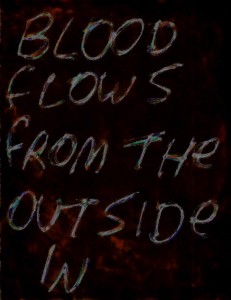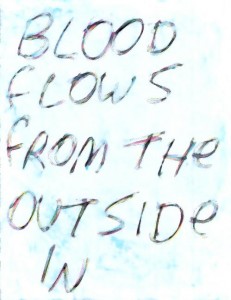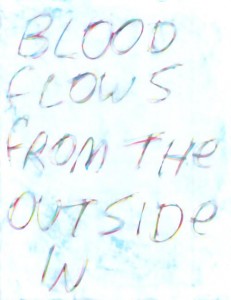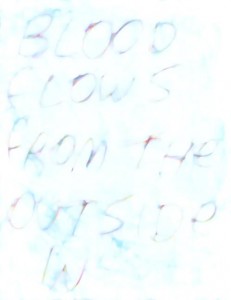'one medium is a resonance of and for other mediums': An Interview w/ Paul Ebenkamp, Part III
BY John Sakkis
John:
Earlier you mention that your appreciation of various media all register at a similar intensity, that visual art, music and poetry all kind of "blurs together" for you, you say "the idea being giving one's self permission to do things," I'm wondering if this line of thinking extends into your performance of these poems (performance in general), the book is so multimedia, it seems rich for some kind of all encompassing presentation, but maybe I'm just projecting my own wants and expectations!
Paul:
john, thanks for this last question, a great one, yes I want to present this work in rich and intense AV contexts! in using light and sound as co-transmitters other than and alongside voiced poems, i mean to evoke an ideal receptivity. always fraternize with the enemy.
i make music in an amateur capacity using strings and devices. you can hear a bit of it HERE. it's a head-scratcher to figure out how to incorporate nonvocal/nonbodied sound sources into the recitation of poems in a way that is not totally insipid, but I'd like to do it...
the habits and imagination that made the work in this book were fed as much if not more by The Dead C, Eliane Radigue, Nurse With Wound, DJ Screw, Iannis Xenakis, Sun Ra, Viodre, Laurie Spiegel, David Tudor, Beherit, Immortal, Enslaved, Thou, Evoken, Asmus Tietchens, Prurient, Drexciya, Joe Colley and Nuno Canavarro as it was by Emily Dickinson, Gertrude Stein, Samuel Beckett, Barbara Guest, Wallace Stevens, Brenda Hillman, Graham Foust and so on.
the other day i read poems in a cavernous and whisper-quiet white-cube art gallery space where i used to see noise shows. the disjunctiveness of that experience was enjoyable because it pointed up the general consensus that we all, for various reasons, operate at a fraction of our capacity and that wherever you look/listen, as much is being withheld as is being bestowed. there was an old slide projector chunking noticeably along during the reading which the organizer eventually turned off, but i wished they'd let it keep doing its thing.
dada, punk, noise and situationist tactics and aesthetics influenced the ostentatious collage-imbalance of the book, and those extend, though pretty haplessly, to my readings/performances of the poems. also Throbbing Gristle's motto "We Guarantee Disappointment" is of great appeal. i don't really know what i ever want out of a poetry reading or talk, and am pleased and disappointed in equal turn for the most part (Lisa Robertson's Scalapino lecture the other night straight-up stole my face), but disappointment is, in my experience, a much more powerful source of inspiration than pleasure. since i've often been bored by poetry readings i am glad now to be in the position of, if not thrilling, then possibly boring or frustrating other listeners, thereby engendering more productive audience dissatisfaction.
a few times during my readings I’ve played, by holding a dictaphone up to the mic, these really intense recordings that I made of Buddhist temple performances in Nepal where I spent a month last summer. the overtones could cut up a brick. the sense/use of these performances is to clear out the last year of all of the nonsense and poor conduct you may have brought into the whirlpool world. my sense/use of sound in poetry is related to this. sound both overwhelms and evacuates discourse and other forms of self involvement/engrossment. sound is air's vibration and air never doesn't vibrate. sound is neither suchness nor nothingness. it seems to destabilize dualistic thinking. here i mean to speak only for my experience, not to be philosophical or general, i mean these are specious and unphilosophical generalizations, OK, but ones that I feel in my bones, full of cellophane marrow as those bones may be. i'm into crystals?, is i guess more or less what I'm saying? i don't really mean that, uh, but on the other hand(s), i DO mean that...
(speaking of nepal, oxfam international is an aid group reputable for conscientious expenditure of relief donations.)
i keep feeling like it's tricky to "perform" the work in The Louder the Room the Darker the Screen due to its polykinetic source meal, but it would be consistent with the above view/description of the power of sound for me to simply disregard the mental build-up of inspirations and sustenances and just read the work as the situation dictates, right? right.
cellophane marrow is one of my music project names. lots of very high and very low pitches on those tracks.
at the end of the day I remain perplexed by how compartmentalized The Arts are for many practitioners. i'm no exception to this, of course; the imposed boundaries of normative disciplines influence the language i use to influence myself on this topic. but i will state flatly that one medium is a resonance of and for other mediums, one sense a resonance of and for other senses. the interest I continue to find in writing poems is related in many ways to my knowing how to use an X-acto blade, a dictaphone, and at least one musical instrument, more or less, which is to say in practice, to keep myself from being simply fed to the ambience of chain restaurant Earth.
to conclude, here's a few new pieces i made on my lunch break today.
thanks for this great interview, john! send me some more SQUARE CAPS, we shd collab sometime
-- xo P
John Sakkis is the author of The Islands (Nightboat Books, 2015) and Rude Girl (BlazeVOX Books, 2009...
Read Full Biography





